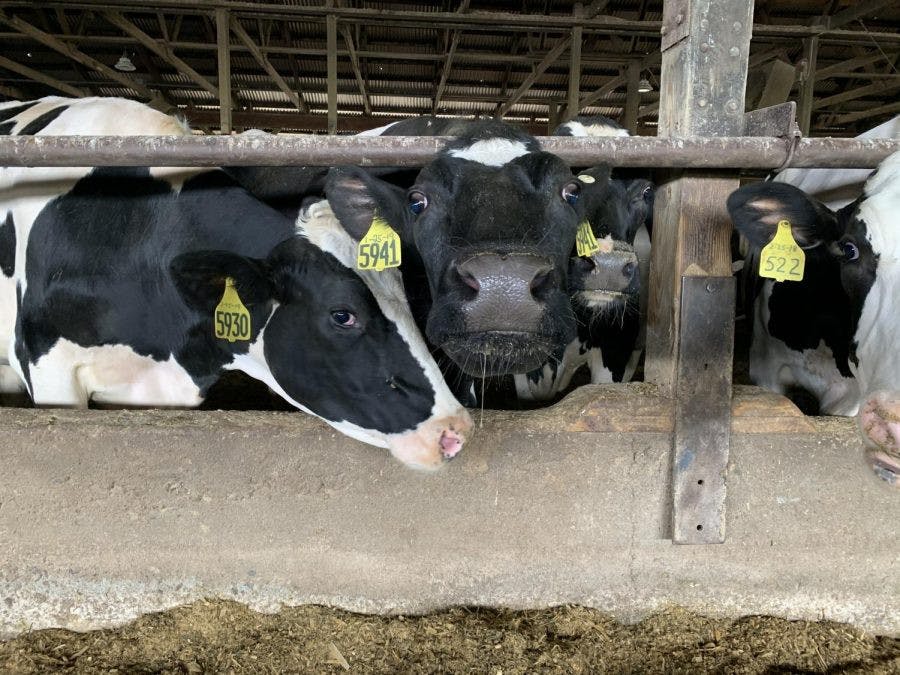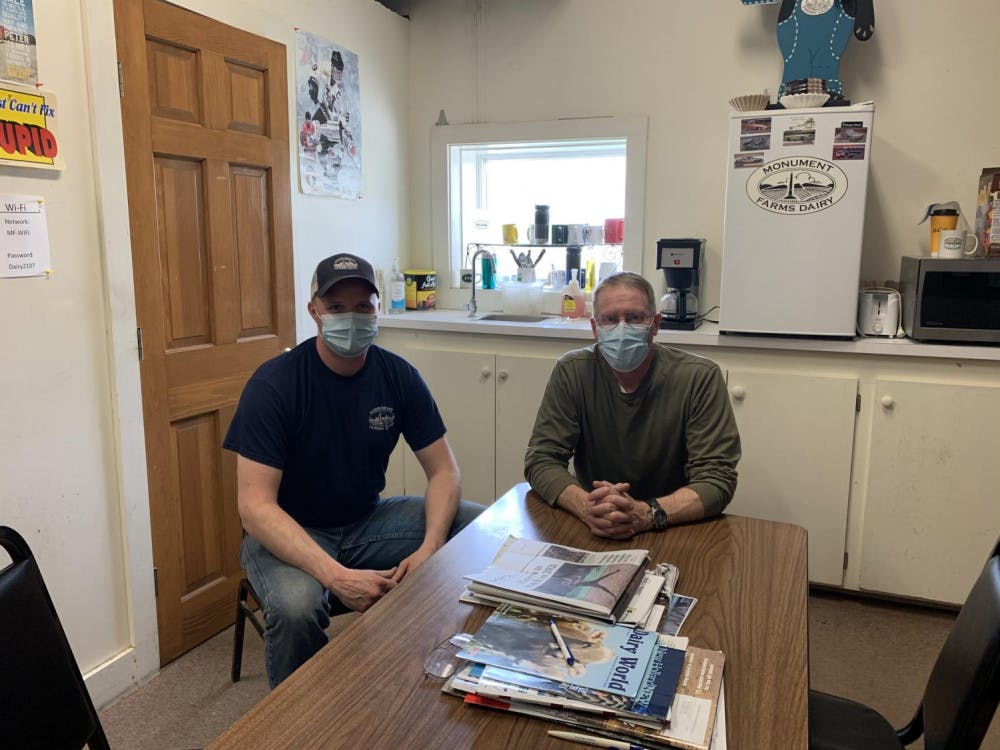Monument Farms Dairy has undergone years of change since becoming the college’s leading dairy provider in the 1950s. While this year was more tumultuous than most, the farm handled its challenges as it typically does: with a vigorous commitment to quality milk, family-style.
Monument was started in the 1930s when Richard James began bottling milk in his basement to sell along a home delivery route. The farm has remained in family ownership ever since and is now owned and operated by the third and fourth generations of dairy farmers.
Dan James is part of that fourth generation and leads sales and distribution at Monument.
“My generation, the fourth generation, is heavily invested in things and are in their early 30s, and we have the mindset of not selling out to the big guys,” James said.
This attitude has endured throughout years of growth at Monument, as their farm, plant and number of clients have grown. Monument Dairy includes both a farm and a processing plant, which allows the team to supervise all parts of the process. The processing plant is located on James Road, while the farm is a third of a mile away on Weybridge Road.

At Monument, cows are typically milked twice a day, with each cow producing around 44 gallons of milk per day.
Since Monument is a smaller farm compared to other dairy producers, growth tends to happen slowly, as they must take time to save up to make large renovations, such as buying larger holding tanks for milk or expanding their barn. In addition, any large increase in production must start from the ground up, as it requires growing more crops and raising more cows, a process that takes time.
Jon Rooney has been the plant manager at Monument Farm since the 1980s and has seen his fair share of growth at the farm.
“Our competitors, all they really need to do is order in another tank-load of milk, whereas we’ve got to grow the crops and grow the cows,” Rooney said.
“[These top-to-bottom operations] force us to grow slowly, which is actually I think a benefit, because it would be really easy to take a bunch of customers and kind of go hog-wild, and all of a sudden you really quickly find your weak points,” James said. “We tier up slowly, and it seems to work.”
Part of this growth has been aided by the farm’s relationship to the college, which began 65 years ago when Monument began selling milk to the college dining halls.
According to Rooney, college students used to drink two to three times more milk than they do today. He attributes it to several changes that the dining hall has made, including the inclusion of several alternative milk options. The dining halls currently offer almond and oat milk along with dairy milk.
In addition, Rooney cited changes to the size of glasses and the removal of trays from the dining halls as key factors that reduced milk consumption.
“First off, the college stepped down to smaller glasses, because the bigger glasses that they had in the dining hall could also fit a 12 oz. beer really well, so they kept [disappearing],” Rooney said. According to Rooney, smaller glasses meant students would take less milk each time.

Monument has a dedicated nutritionist and feed-mixer that works with the herdsman to create custom mixtures for cows in each stage of their life.
“At the same time, they did away with the trays because they were getting used for sleds and stuff,” said Rooney. “All of sudden, you need one hand to carry your milk, and so it gets left behind.”
Weathering the Pandemic:
According to Rooney, the dairy industry easily “backs up,” meaning that changes in demand or supply can have repercussions throughout the whole system. According to Rooney and James, milk consumption initially decreased during Covid-19 as institutions like schools and restaurants closed temporarily, which caused several farmers, including Monument, to dump milk that they could not sell.
Sales of milk then picked up as people began buying excess milk. Cross-country networks couldn’t keep up with the sudden demand for milk, so stores limited the quantity of products that each customer could purchase.
“The logistics of it — they couldn’t get it to the places fast enough so stores were limiting their quantities so that they wouldn’t run out of stock,” James said. “Due to our situation, we could’ve increased our deliveries because we’re smaller scale.”
The pandemic also caused milk prices to drop by around 40% overnight. To make up for lower milk prices, the USDA gave dairy farmers financial assistance, and farmers, including Monument, were able to receive assistance from the Paycheck Protection Program.
Covid-19 also gave Monument Farms the chance to introduce an online portal allowing customers to buy products in advance. This interface replaced the previous system, which required customers to place orders in person on site for the next delivery.
“People’s mindset about change is very hard to overcome,” James said, alluding to some hesitancy about the change.
With everything already changing due to Covid-19, however, customers were more willing to make the switch. “Just the fact that everything was changing at the same time meant that it was a smooth introduction to that,” James said.
Even though Covid-19 brought its fair share of hardship to Monument, Rooney found it comforting that milk is still valued.
“I was actually kind of relieved to see that a lot more people than I thought would consider milk to be one the essentials — I mean, besides toilet paper,” Rooney said.
Future of Dairy
While the pandemic may have temporarily reaffirmed the demand for milk, the future of dairy still seems uncertain.
Dairy has become a topic of concern in recent years, including for the Lake Champlain Citizen Advisory Committee and candidates for governor. Most of the discussions center the environmental impacts of dairy and the economic viability of the industry.
“The ones who are vocal get elected into office, and all of sudden there’s a political viewpoint that everything is changing,” James said. “Vermont farmers who have been around forever just put their heads down and continue to work and aren’t given a voice.”
A 2018 study found that the production of one glass of dairy milk creates almost three times as much greenhouse gas as a glass of plant-based milk. Most of this greenhouse gas is emitted in the form of methane, which is released by cows when they first digest their food and whenever manure is handled.
Plant-based milk presents other environmental challenges. Pesticides used in the production of almond milk have proven to be harmful to bee colonies, for example, and the production of rice milk requires massive amounts of water and also releases methane into the air.
Monument Farms has implemented some changes to address environmental concerns. The farm recycles the manure produced by cows by feeding it into an anaerobic digester, which then produces enough electricity to power the entire farm and processing plant. Digested manure is then sifted through a mechanical separator, which separates solids that can then be used for bedding or sold to the public.
Rooney acknowledges that dairy farming can pose challenges to the environment but is optimistic about dairy’s ability to adapt to changing standards.
“Every farmer we know is totally invested in their environmental impact and always adopting new techniques to reduce their impact or turn it into positive impacts,” Rooney said. “I think that dairy people appreciate that they’re under the microscope and need to adapt to new technologies.”
While the environmental impacts of dairy are an important consideration, the most immediate concerns for dairy farms are dwindling dairy prices and reduced demand while costs remain largely fixed.
Dairy prices have been on the decline since 2015 and were just starting to increase before the Covid-19 pandemic hit, which caused prices to plunge. According to the USDA forecast, however, prices are expected to increase slightly in 2021 due to the strong demand for dairy products abroad.
“You can’t argue too much against [lower prices]. I mean, if that’s the value being placed on the product. You can’t really artificially create value.” Rooney said. He attributes expansion of larger and larger farms to dwindling dairy prices, as they have the capacity to absorb different shocks in the dairy industry.
Despite these changes, Monument has remained committed to quality.
“Because our name’s on every container, we have to take great pains to make sure everything’s done right every time,” Rooney said.

Lucy Townend '22 is a Managing Editor alongside Abigail Chang.
She previously served as a senior section editor, a local editor, and a copy editor.
Townend is majoring in International Politics and Economics, studying French throughout her years at Middlebury and is planning on completing a thesis focused on income inequality and regime change.
This previous summer, Townend interned as a private banking analyst at a mid-sized bank in Chicago and plans to continue her work there after graduation.

Julia Pepper '24 (she/her) is the Senior Local Editor.
She previously served as a Local Editor. She is a Psychology major and French minor. This past spring she studied in Paris. She spent the summer interning at home in New York City, putting her journalistic cold calling skills to use at her internship doing outreach with senior citizens. In her free time she enjoys reading and petting cats.




